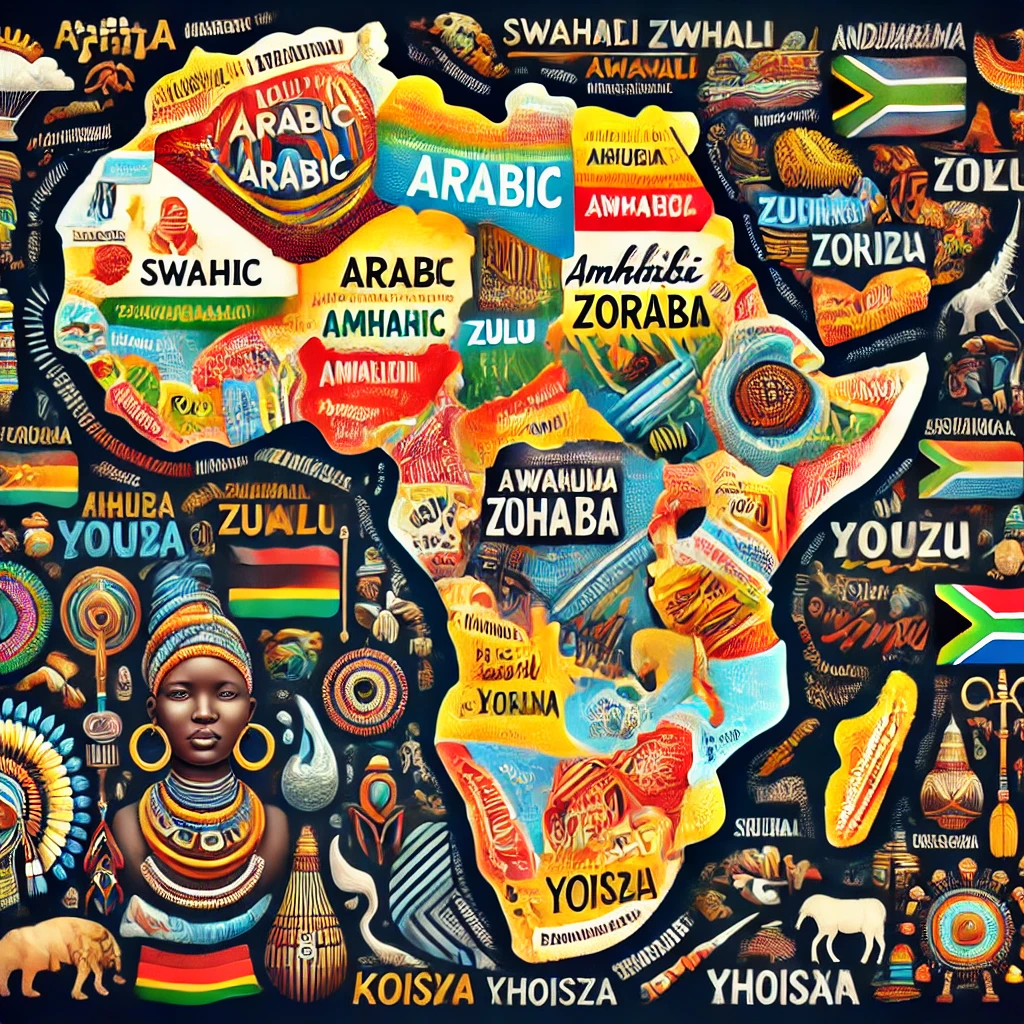Major Languages Spoken in Africa
Africa is incredibly linguistically diverse, with over 2,000 languages spoken across the continent. These languages are often categorized into major linguistic families. Here’s a detailed breakdown of the major languages spoken in Africa, including their cultural and geographical significance:
Major Linguistic Families and Languages in Africa
1. Afroasiatic Languages
This family includes languages spoken in North Africa, the Horn of Africa, and parts of the Sahel. It has several branches, including Semitic, Berber, Cushitic, and Chadic.
- Arabic
- Spoken in: Algeria, Egypt, Morocco, Sudan, Tunisia, Libya, and other North African nations.
- Cultural Significance: Arabic is a liturgical language for Islam and is widely used in government, media, and education.
- Amharic
- Spoken in: Ethiopia.
- Cultural Significance: Amharic is Ethiopia’s official language, deeply tied to its history and Orthodox Christian traditions.
- Berber (Tamazight)
- Spoken in: Morocco, Algeria, Libya, and Mali.
- Cultural Significance: Berber communities have preserved their cultural identity through art, music, and language.
- Somali
- Spoken in: Somalia, Djibouti, and parts of Ethiopia.
- Cultural Significance: Somali is the national language of Somalia, reflecting its rich oral traditions.
2. Niger-Congo Languages
This is the largest language family in Africa, covering most of Sub-Saharan Africa.
- Swahili (Kiswahili)
- Spoken in: Kenya, Tanzania, Uganda, Rwanda, Burundi, and the Democratic Republic of Congo (DRC).
- Cultural Significance: Swahili serves as a lingua franca for East Africa and is used in trade and diplomacy.
- Yoruba
- Spoken in: Nigeria, Benin, and Togo.
- Cultural Significance: Yoruba culture is known for its vibrant festivals, traditional religions, and music.
- Zulu
- Spoken in: South Africa.
- Cultural Significance: Zulu is a key language in South Africa, representing the country’s largest ethnic group.
- Igbo
- Spoken in: Nigeria.
- Cultural Significance: Igbo culture emphasizes trade, art, and traditional governance.
3. Nilo-Saharan Languages
Primarily spoken in the central and eastern parts of Africa.
- Dinka
- Spoken in: South Sudan.
- Cultural Significance: The Dinka people are known for their cattle herding traditions.
- Nuer
- Spoken in: South Sudan and Ethiopia.
- Cultural Significance: Closely tied to pastoralist lifestyles.
- Kanuri
- Spoken in: Nigeria, Chad, Niger.
- Cultural Significance: Kanuri was historically the language of the Kanem-Bornu Empire.
4. Khoisan Languages
Known for their distinctive click sounds, these languages are spoken in Southern Africa.
- Nama/Damara
- Spoken in: Namibia and Botswana.
- Cultural Significance: These languages reflect the traditions of the indigenous Khoisan peoples.
5. Austronesian Languages
These are spoken on the island of Madagascar.
- Malagasy
- Spoken in: Madagascar.
- Cultural Significance: Malagasy reflects a blend of African and Southeast Asian influences due to Madagascar’s unique history.
Key Multilingual Regions
Africa’s multilingualism is often tied to its colonial history and indigenous diversity. Many nations have multiple official or widely spoken languages:
- South Africa
- Recognizes 11 official languages, including Zulu, Xhosa, Afrikaans, and English.
- Nigeria
- Over 500 languages spoken, with Hausa, Yoruba, and Igbo being the most prominent.
- Ethiopia
- A mix of Afroasiatic and Nilo-Saharan languages, with Amharic, Oromo, and Tigrinya being dominant.
- Ghana
- A mix of languges spoken by the people, majority understands the Akan language, Twi, Fante others Ga, Ewe, and Dagaare.
Role of European Languages
European colonial powers introduced languages such as English, French, Portuguese, and Spanish. These remain official or widely used in many African countries today.
- English: Dominant in Nigeria, Kenya, Uganda, Ghana, and South Africa.
- French: Widely spoken in West and Central Africa, including Côte d’Ivoire, Senegal, and Gabon.
- Portuguese: The official language in Angola, Mozambique, and Guinea-Bissau.
- Spanish: Spoken in Equatorial Guinea and the Canary Islands.
Cultural Significance of African Languages
Languages in Africa are more than a means of communication; they carry rich traditions, histories, and identities. From oral storytelling to music and art, African languages are deeply embedded in the continent’s cultural fabric. The preservation and promotion of indigenous languages remain crucial to maintaining Africa’s cultural diversity.

